Sarahbeth Caplin's Blog, page 40
December 15, 2015
Advent, refugees, and restoration
Christmas, as Christians know, is a time for thinking about restoration – not just in the form of God meeting us as a squalling baby, but in our own lives, as well. I really liked this question-and-answer sheet in my weekly small group last week:
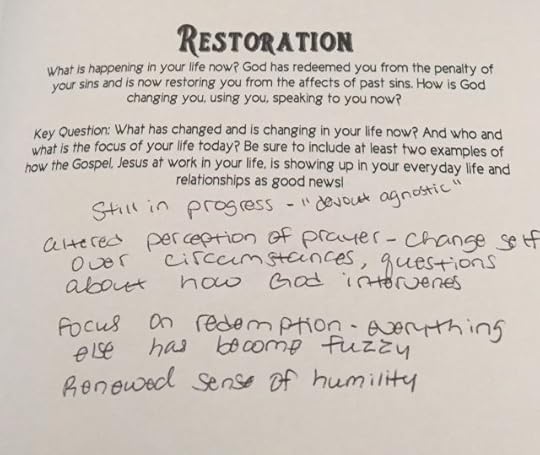
Clearly it’s not finished yet. I don’t know if it will ever be finished. Part of the problem is that I’m extremely hesitant to see “restoration” in a tangible way. I know many people do: answers to this question at my table varied from new jobs or opportunities, meeting future spouses. While it’s true that some of the worst experiences in my life have given me my best writing material, and that material has benefitted me financially, I hesitate to say that’s from God when I’m already quite comfortable in that regard. I prefer to think of “restoration” in terms of inside work. My restorative goals are learning to forgive people who will never be sorry and learning to move forward despite never receiving apologies for past wrongs.
But that’s not how many Christians I know use that word, and that troubles me.

I’ve vented about this before, but Christmas, especially, is a time to really consider what we mean when we praise God for gifts that more likely come through hard work or simply being born into a state of privilege. I keep seeing Facebook posts from people praising God for new cars, new homes, or finding a $20 bill in the pocket of old jeans, and it’s becoming really difficult not to judge.
I personally feel that the Syrian refugee crisis coinciding with Advent is no coincidence, but a motion to get us Western Christians thinking about what it truly is to be poor in possessions but rich in spirit. I cannot reconcile an infant savior born in a filthy stable to parents who would be on food stamps if they lived in 21st-century America with this borderline prosperity-oriented thinking. I know part of being a Christian is finding a community to grow with, but it honestly hurts my relationship with God when so many people see him as a gift-giver doling out more blessings to people who, as it appears on the outside, already have enough.
Judaism teaches about tzedakah, or charity, and tikkun olam (“mending the world”) as obligations that are just as mandatory as Christ’s command to “Give up everything and follow me.” Those teachings influence my faith more than anything else.
Filed under: Religion Tagged: Christian culture, Christianity, Christmas, evangelicals, Facebook, First World Problems, Judaism, Syrian refugees








December 9, 2015
#SolidarityWithStoya: What the church can learn from porn about consent

How much can you change the world with 55 words?
On the 28 th of November, in two tweets, Stoya—who is in no particular order a famous porn actress, an activist, a writer and a friend of mine—unambiguously accused her ex-boyfriend, fellow porn actor James Deen, of rape. “James Deen held me down and f–ked me while I said no, stop, used my safeword,” she wrote. “I just can’t nod and smile when people bring him up anymore.”
Within days, the porn industry had turned against its golden boy. In so doing, it became the first professional community to respond to allegations of serial sexual violence by actually believing women from the start (Read the full article here )
It’s probably not a surprise to know that I am no fan of the porn industry. I’m one of those feminists who thinks porn reduces women and men into nothing more than objects for pleasure, stripping them of their humanity.
That being said, there are plenty of porn actors who view porn as empowering, and genuinely love what they do. It’s those actors and those industries that respect its employees (by having a clean work environment and allowing contraceptives, for starters) that I want to talk about – not the ones in which abuse happens on set and employees are treated like chattel. Those exist, but that’s not the kind in the spotlight here.
With that in mind, I have to say that I’m surprised and yet not surprised to see so many people supporting Stoya. I’m surprised because, as we all know, the world is not always fair to rape victims. But I’m not surprised to see other people in the adult film industry supporting her because I really think such people might have a better understanding of consent than the average person does.
Think about it. As a job that requires all kinds of sex with strangers, porn demands consent. It requires a trust that all parties can be professional and courteous to one another in order to, well, “perform well,” just as all employees should in all other professions. But the nature of the job is so personal. Bodies, no matter your political or religious beliefs, are personal by definition.
Fundamentalists of the Christian Right, on the other hand, claim to revere sex as holy, which I agree with. Yet the notion of consent is almost entirely absent from their sexual rhetoric. We’ve heard of the appalling accusations against notable figures such as Josh Duggar, Bill Gothard, and Mark Driscoll. But the internet is full of people defending what they did because “none of us are perfect” and “everyone falls short of the glory of God.” For a religious practice that is supposed to revere bodies as temples, that’s a mighty callous response when someone desecrates that temple, don’t you think?
We also have theologians like John Piper claiming that marital rape and domestic violence don’t exist, as it is the wife’s responsibility to submit to her husband no matter what. Frankly, it is ironic that the porn industry places more emphasis on defending women than the church has! Christians, who (almost) universally condemn abuse and mistreatment, should be outraged by this.
I never thought I’d say that the porn industry could have anything positive to teach people, but in this case, it absolutely does. In this case, the porn industry (or at least the one Stoya works for) has a more comprehensive understanding of how consent is supposed to work, and frankly, churches ought to take note.
Filed under: Feminism, Rape Culture, Religion Tagged: Christian culture, Christianity, Controversy, evangelicals, Feminism, rape culture








December 7, 2015
Wake me up when December ends
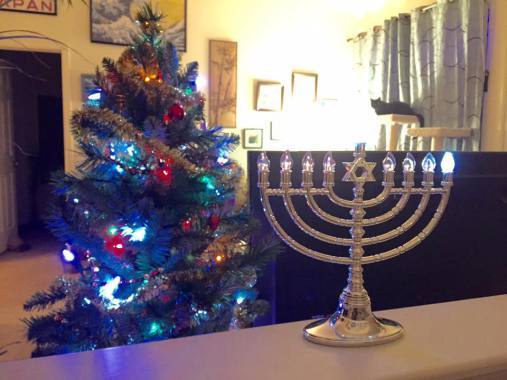
The struggles of living in rural Farmville: if the one Target doesn’t have what you’re looking for, then chances are you won’t find it anywhere except online. I was in search of an electric menorah, since a regular one didn’t seem feasible with two curious kitties in the apartment. Hanukkah had little significance in my family, but I’m used to seeing a menorah on display in December.
My quest took me 40 minutes out of the way to a store called Jerusalem Gold. On the outside, it looked like a typical Judaica store. Inside, it was difficult to find merchandise that wasn’t engraved or otherwise decorated with crosses and Jesus fish. The display of necklaces in the front glass case featured Star of David necklaces with tiny gold crosses inside – something I desperately wanted in college, though once I did acquire one, it turned out I wasn’t brave enough to wear it. It’s a bold statement to make, and not everyone who sees it will assume it’s a nod to honoring Jewish heritage while holding Christian beliefs.
In short, that store brought back all kinds of memories of struggling to fit two sides of me together like puzzle pieces in the fist of an impatient toddler. I was trying to shove pieces where they didn’t fit. It’s not that my faith was ever explicitly Jewish in the first place; it was the heritage and tradition, the thought of betraying my family, that plagued me with guilt. At the same time, denying a faith I was slowly believing to be true would produce a different kind of guilt. I was literally damned if I converted, damned if I didn’t.
The funny thing is, if I did want to Judaize my Christian faith, this store (with a chapel attached) proved there was a community for that. In my early Christian days, my new friends at Cru tried to push me into this community, believing it was a perfect compromise. Much of my early Christian experience involved being pushed and goaded in different directions, as if my friends had a better handle on God’s will for my life than I did.
Truth be told, I am just as uncomfortable in a Judeo-Christian environment like Jerusalem Gold as I am in mainstream Evangelical churches. What I long for is a community of like-minded believers who share a cultural appreciation for Judaism, and treat it as an ethnic identity over a spiritual one. That is the compromise I have come to: no one can force me to disavow my upbringing because of what I believe now. Yet there is nothing I can do about studying Christianity through Jewish lenses, because that’s all I know how to do.
And despite learning new vocabulary and new prayers, being baptized and joining a bible study, there is no other point in the calendar year that I feel most Jewish than during December. To this day, I have no Christmas traditions (unless Chinese food and a movie count). December 25th still means nothing to me – in my mind it’s separate from the season of Advent, which is far more significant. I still can’t stand Christmas movies, which I never watched as a kid but just couldn’t get into as an adult, and contemporary Christmas music drives me insane (the hymns, on the other hand, are my favorite Christian songs ever produced). And it still tweaks my nerves that some people don’t make any effort to be inclusive when they say “Merry Christmas” over “Happy Holidays” to strangers, even though their intentions are good.
Once Thanksgiving is over, I start singing a rendition of the Green Day song: Wake me up when December ends.
In the end, I did find a generic electric menorah, which cost quite a bit more than I thought it was worth, but I bought it anyway. The cashier, who wore a yarmulke and a cross, wrapped it up for me and wished me a blessed holiday season. I reciprocated those wishes and left, struck once again by the diverse ways people find truth. I’m glad it’s not my job to determine whose way is the “correct” one.
Filed under: Religion Tagged: Campus Crusade for Christ, Christian culture, Christianity, Christmas, evangelicals, Hanukkah, Judaism








December 3, 2015
#GodIsntFixingThis: Why do we pray?
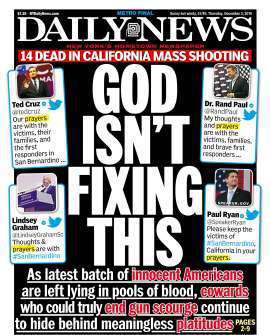 My first reaction when I saw the following headline on the cover of New York Daily wasn’t outrage (though admittedly, I was surprised) or indignation. The first thought that popped into my head was, Well, maybe this is because many of us have an inaccurate understanding of prayer.
My first reaction when I saw the following headline on the cover of New York Daily wasn’t outrage (though admittedly, I was surprised) or indignation. The first thought that popped into my head was, Well, maybe this is because many of us have an inaccurate understanding of prayer.
Which isn’t to say that my view is the correct one. But I have a few theories. So far, no Christian I’ve spoken to has been able to answer these questions for me:
If God already has a will, is prayer supposed to change his mind?
Why are we praying for God’s Will to happen if God’s Will will happen regardless?
If God waits on prayer before allowing (or not allowing) certain events to happen, wouldn’t that mean he doesn’t know the future?
My lived experience has taught me (and other notable theologians like CS Lewis and Soren Kieerkegard) that prayer is more about becoming like God and communing with him as opposed to changing our circumstances. I can’t imagine an Almighty God bending time and space (and occasionally laws of nature) to ensure someone gets an up-close parking spot or healing from the flu while scores of people all over the world are suffering inexplicable violence and depravation, but I can imagine God providing the tools with which to make change happen.
Naturally, not all of us agree on the same tools with which to do this, which is why we find ourselves stuck when it comes to gun control. Of course, my biggest question is why God couldn’t answer prayers to prevent shootings from happening in the first place, rather than answering the prayers asking for comfort to the families of the dead. But what would mere humans know about that?
Do you agree or disagree? Why do you pray?
Filed under: Religion Tagged: Christian culture, Christianity, Controversy, evangelicals, First World Problems, prayer








November 30, 2015
Does Jesus really make people “better”?
I remember being a new Christian and looking down on classmates who also claimed to share my faith, but lived “alternative lifestyles”: ie, drank a lot, had premarital sex, etc. True faith, per the teachings of Campus Crusade for Christ, began in someone’s heart and flowed outward in their actions. You’d know Christians by the way they stood out, especially on a wild, liberal campus like Kent State.
Then you have people like Robert Lewis Dear who shoot up Planned Parenthood clinics and claim they’re doing the work of God. And once again social media blows up (er, pun unintended) with #NotAllChristians posts before you can finish saying the word “hypocrisy.”
Jesus is supposed to sanctify people and enable them to become more like him. So how do you explain, then, the justification of violence by people like Dear? Is he not a real Christian? He thinks he is…and Twitter is full of posts from other self-professed Christians supporting his homicidal religious rhetoric.
The following passage by Gregory Boyd from Across the Spectrum summarizes what I was taught in ministry about sanctification:
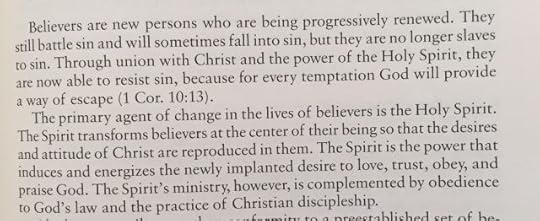
Who, exactly, are the real Christians here? Is it really the same Jesus telling people like Mother Theresa to live among the poor while telling others to wage war against people who don’t adhere to their principles? One of these groups has to be wrong, but which one? They all use Scripture to justify their actions, and that’s the biggest problem with the No True Christian line of thinking.
What’s a believer to do when real-world experience doesn’t line up with what Scripture says to expect?
I’ve watched this madness unfold from behind my computer screen, resisting every temptation to share my opinion (which wouldn’t be that original anyway). The more angry tweets I read, the more comfortable I become in the knowledge that no one – not John Piper, not Pat Robertson, not Ken Ham, or any other prominent icon in the theological realm – knows for certain if they’re “doing faith” correctly. Mind you, it’s taken me years to arrive at this still-uncertain place of humility, because I’m just as likely as anyone to get defensive if someone tells me I’m wrong. But I could be – and so could you. With two thousand years distancing us from the early Christians and 40,000 Protestant denominations since, the odds that any of us in the 21st century has it “right” are likely not in our favor.
Some would say that this is the beauty of the body of Christ, that we all have different things to teach and learn from each other. That’s optimistic; I wish I could agree. In my experience, Christianity is not a monolithic thing no matter how much I wish it were, and the “brand” that I practice is the one that speaks the most truth to me. And the Robert Dears of the world will continue to embrace the brand that makes sense to them, even if I and many others believe they’re batnuts crazy.
That is why I no longer feel threatened when “one of my own” does something horrible like this. I no longer feel like I have to apologize for his actions and worry about him making me look bad because I don’t think Robert Dear and I follow the same Jesus, even though it’s his right to call himself Christian. If the Holy Spirit’s job is to sanctify, then I’d say Dear has been thoroughly sanctified in the denomination he embraces: the kind that measures holiness in acts of extremism. And thankfully, it’s not my job to judge if that kind of Christianity is the “true” kind.
Filed under: Religion Tagged: Campus Crusade for Christ, Christian culture, Christianity, Controversy, evangelicals, Ken Ham








November 24, 2015
Wil Wheaton: “You can’t pay rent with unique platform and reach”

I want to discuss an article I read a few weeks ago, in which actor Wil Wheaton writes about the indignity of compensating writers for their work with exposure over money. On the whole, I agree with him. Unless you have the good fortune of being related to someone who already has a platform – imagine being JK Rowling’s kid! – then you will be starting your career from the ground up, having little to no choice but to accept offers of free publicity, because you haven’t built enough of a name for yourself to guarantee media traffic with your name alone.
For many of us, myself included, free publicity in the form of a guest post on a well-known blog IS the payment. With luck, that “payment” will become monetary if the traffic leads back to my own site, where new readers eventually purchase my books. But writers have bills to pay like everyone else, and we can’t keep giving our work away for free forever. There’s just one teensy problem I have with Wheaton’s article.
Wil Wheaton can afford to complain about being paid in publicity over money. Because he’s Wil Wheaton (at least he acknowledges this). When he writes a book, all the Big Box stores are begging to sell it, because the stores know they’ll make enough in sales to compensate him (or rather, his publisher, which trickles royalties down to him). But if I want stores to sell my book, I have to approach them myself. And I have paid for the chance to have prominent shelf space for my books, because otherwise they’d never get noticed. I consider that a worthy sacrifice.
It’s not always a bad thing to be paid in exposure. The real question is when we stop accepting this form of payment and demand that we deserve more. It’s the same logic of a college graduate with several resume pages of unpaid internships that were accepted under the pretense of “earning experience” to impress future employers. At what point do you start turning them down? You don’t want to miss potential opportunities, but you also need to, you know, live.
The Huffington Post can damn well afford to pay guest writers. As Wheaton said, if you’re worthy of being published, you deserve to be paid, no matter how successful you are already. It’s not about making a rich person richer, but respecting the hard work of the artist.
Filed under: Writing & Publishing Tagged: Author Sarahbeth Caplin, Indie Author Life, self-publishing, Wil Wheaton, Writing








November 20, 2015
An atheist’s advice on defending Christianity (and other thoughts)
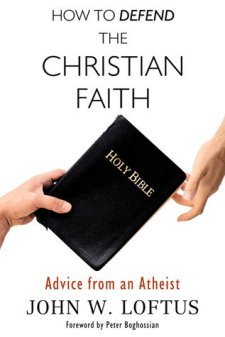 I have ten pages left of How to Defend the Christian Faith: advice from an atheist, but I doubt they’ll change the opinion I’ve formulated already. The book certainly accomplished what it set out to do: it made me think.
I have ten pages left of How to Defend the Christian Faith: advice from an atheist, but I doubt they’ll change the opinion I’ve formulated already. The book certainly accomplished what it set out to do: it made me think.
John Loftus writes in the introduction that many conservative Christians will bristle at the title and fear what a book like this will do to their faith, so I pride myself a little bit on not being one of “those” Christians – I like being challenged (well, to a point). The writing style itself though is pretty abrasive, and it’s a big turnoff when an author plugs his other books multiple times before the second chapter. Still, I think it’s worth reading and discussing.
This idea isn’t unique to Loftus, but he mentions that adult converts to the Christian faith are most often seeking ways to find meaning after life-altering events, not so much because they find the evidence in favor of Christianity compelling. I’ll agree with him there. I was nineteen years old when I “prayed the prayer” for the first time, though my fascination with Jesus started long before that. I was moved primarily by the doctrine of grace and redemption: that God can make broken things new, which is much more appealing than the old trope “everything happens for a reason.”
Furthermore, a god in human form was just more accessible than the distant father God of the Old Testament who, let’s face it, was kind of violent and angry. My conversion makes even more sense considering the abusive relationship I was in at the time, in which my boyfriend’s actions and words convinced me I was worthless. Jesus dying on the cross for my sins was an extreme act that proved I had value. So yes, my reasons were emotional.
But Loftus also makes criticisms of Christianity that even other Christians might agree with, and that has to do with the issue of cherry-picking. He argues that there’s no way the Jesus story makes sense without a literal Adam and Eve, and science has proved that the human gene pool is too diverse for all of humanity to have descended from just two ancestors (who, it is assumed, arrived to earth in full homosapien form, bypassing all the earlier Neanderthal developments). No evolution means no Fall in the garden of Eden, meaning no original sin. This is something I have thought about a lot, and while I agree that there’s a lot of reorganizing theology happening in light of scientific discoveries, I still don’t agree that evolution being true = Jesus didn’t rise from the dead. Even theologian Timothy Keller agrees with this viewpoint.
But Loftus’ larger point is that Christians are quick to reinterpret the Bible in light of both scientific discoveries and cultural reformations, such as the abolition of slavery and, most recently, the legalization of gay marriage. They’ll argue that Scripture was meant to be interpreted this way all along, we just didn’t figure it out until now. I agree with Loftus that these “revelations” are rather convenient, and I suspect my friend Neil Carter, blogger at Godless in Dixie, is right in his prediction that fifty years from now, when gay marriage is widely accepted, Christians will say they were the champions of equal rights all along.
That’s a lot to take in for such a short book. Loftus’ best achievement, as I’m sure was his goal, was in making me think on why I became a Christian in the first place, and why I still call myself one today. I’ve written before that there’s a lot about Christianity I don’t understand, and don’t even like: hell being the biggest stumbling block. But if I don’t understand something, I read everything I can about it. I bristle at the accusation that I’m just another Cafeteria Christian, so saying “I don’t know” or “I don’t get it, either,” feels like a safer place to land than “This feels wrong to me, I’ll just cut it out.”
But the list of things I don’t understand keeps growing, which means I say “I don’t know” an awful lot. And if I’m so uncertain, then why bother continuing this journey? What’s the point?
Thinking back to college, I can say that the Christian faith enabled me to make brave and unpopular choices I might not have made otherwise. It would have been much easier to cave to peer pressure without a backbone of faith: pressure to drink underage, pressure to go further with a boy than I was ready to. Faith enabled me to be strong and confident in my refusal to do those things. Faith enabled me to stand up for myself when it was necessary; when a date took me home early when it was clear I wasn’t going to sleep with him. Faith made it easier for me to move past that disappointment, to believe I was worth more than what he saw in me.
Certainly there are people who are not Christian who have made similar choices, and didn’t need God to back them up. Where that kind of strength comes from, I don’t know. I can only say with the authority of my own experiences that without faith, I’d have been weak. Without faith, I’d have had no bigger picture to make any pain and discomfort more bearable.
And to be honest, I miss that certainty; that security. But just wishing I could be that person again doesn’t make it so. I have too many questions now that make it difficult to go back to that place. I’ve never had any reservations about Jesus – he is definitely someone worth following, worth aspiring to. But the God he answers to scares me sometimes. Can you have one without the other? While Christians bicker all the time, and even split churches over doctrinal disagreements, I still think there have to be some distinguishing characteristics that define this faith, and the trinity is one of them. The Gospel, certainly, is the core of it.
Evangelicals will, if nothing else, appreciate Loftus’ insistence that the pickers and choosers are fooling themselves. Once upon a time, I would have agreed. But now I understand that, hey, faith is complicated. Journeys are complicated. Life is complicated! Like Loftus, I’ll always have my judgmental opinions. But reading this book helped me realize that writing people off simply for disagreeing with me only makes the journey more complicated than it needs to be. Being open-minded means being willing to listen. It doesn’t require me to agree and believe in everything I hear.
Filed under: Religion Tagged: atheism, Christian culture, Christianity, Controversy, creationism, evangelicals, evolution, gay marriage, hell








November 18, 2015
“For I was a stranger, and you were afraid of me”
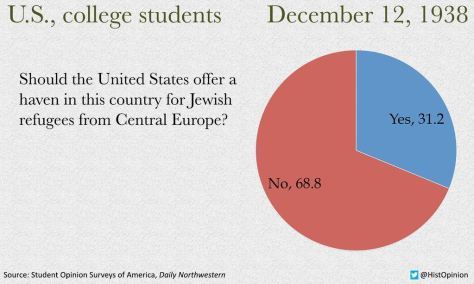
I have frequent moments when culture speaks louder than faith, and this past week was one of those extended moments. You see, when I was younger, I would gauge the strength of my friendships by wondering who would be most likely to hide me and my family in the event of another Holocaust. Actually, I still find myself asking that question. Even if none of my relatives were killed (none that have been confirmed, anyway), it very well could have been my family, if the circumstances of birth, time, and place had been different.
I have to say…I’ve been horrified at what I’ve seen shared on Facebook by many Christians I have worshiped with over the last few years. I realize you can only judge so much of a person’s character by what they show via social media, but in such a dire scenario as this – a scenario in which thousands of refugees are fleeing their war-torn nations and hoping to seek shelter here in America – well, to say I expected better is an understatement. I understand the fear. I understand the apprehensiveness to open your home to people whose identities and backgrounds you do not know. I just figured, as self-professing Christians, that compassion would drive out that fear. I thought empathy would drive out prejudice and outright bigotry.
I was wrong.
Throughout my journey into skepticism, I’ve been exposed to plenty of No True Christian rhetoric: no True Christian supports gay marriage, abortion, whatever. And yet these same gatekeepers of True Christian behavior are acting and speaking in ways that are reminiscent of Germans circa 1939.
One side of my family fled to the US when pogroms started vandalizing Jewish businesses. There’s no way that I can’t, on some level, take these comments personally.
But one need not have Jewish ancestry to be mystified by the Christians who are so quick to condemn all of Islam by picking out a few Koran verses tinged with violence, despite the conspicuous violence in our own texts.
One need not come from a long line of persecuted ancestors to feel outraged by the lack of decency for desperate families trapped in circumstances beyond their control.
And if you think the comparison of Syrian refugees to European Jews in the 30s and 40s is apples to oranges – the Jews, after all, were not suspects of terrorism – the two situations are comparable in that both indigenous groups were, and are, considered threats. Hitler convinced a nation to blame the Jews for deep economic ruin. Fox News and a handful of politicians want to blame Islam for the murders of innocent Americans. Either way, people were, and are, looking for scapegoats. A certain demographic may fit that bill, but it doesn’t automatically mean they’re all guilty.
The difference between being an American and being a Christian doesn’t seem so clear lately. But American Christianity seems to prize a doctrine of fear, and that is when my allegiance between Judaism and Christianity is most tested.
I conclude this post with the immortal words of Hollywood philosopher, Cher Horowitz:
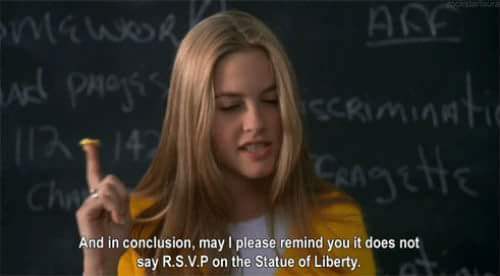
Filed under: Religion Tagged: Christian culture, Christianity, Controversy, evangelicals, Facebook, Judaism, social justice, Syrian refugees








November 11, 2015
‘Confessions of a Jew-ish Skeptic’ showcase reading
I had the privilege of participating in the Colorado State student showcase this week, in which I read excerpts from my upcoming memoir, Confessions of a Jew-ish Skeptic. After workshopping this book in class and then performing, reception to it seems pretty positive.
I imagine part of the entertainment factor for the audience was watching my face go wonky.
Part 2:
My first memoir, Confessions of a Prodigal Daughter, ranked #1 in Amazon’s top 100 bestselling personal growth books in August 2015, and can be purchased here .
Filed under: Religion, Writing & Publishing Tagged: Author Sarahbeth Caplin, Christian culture, Christianity, Confessions of a Prodigal Daughter, evangelicals, Indie Author Life, Judaism, memoir, Seminary, Writing








November 9, 2015
Just how hard is it to be Christian in America?
While the rest of us think they’re ridiculous, there are some Christians who genuinely believe their religious freedom is in jeopardy. Just how difficult is it to be a Christian in the United States, exactly?
I’ve wracked my mind, and can’t come up with anything close to persecution, save for my initial (and, thankfully, unfounded) fear that my family might disown me. That’s not to say there weren’t moments of genuine discomfort, however.
At a liberal party school like mine, it certainly wasn’t popular to be religiously devout. I can recall a few times I faced some heat for having certain convictions, which mainly had to do with sex. As a freshman living in an all-girl dorm, there would always be a group congregating in the lobby area, and let me tell you, women gossip about sex just as much as men do in locker rooms. I’d listen to these conversations with voyeuristic interest, but when someone asked me about my level of experience, I quietly and humbly confessed that I had none. This surprised some, who thought I was “too cute” to still be a virgin. No, I explained – actually, in hindsight, I don’t know why I didn’t just respond with “That’s none of your business” – I’m a virgin by choice. Until marriage.
I don’t think I said this with any arrogance or derisiveness, but that didn’t stop a few girls from mocking that decision, calling it “archaic” and “ridiculous.” That was wrong on their part, as I didn’t criticize their choices not to be celibate, but persecution? Hardly. I wouldn’t even quantify that as bullying. My reputation as the “Third Floor Virgin” barely lasted a week.
There were other ways to feel like an outsider as a believer, though. It’s true that many modern American values – “Do what feels good and makes you happy,” obsession with wealth and consumerism, defining worth in terms of status – do run contrary to traditional Christian ones. And on a college campus especially, having to say no to tempting activities out of conviction – drinking, clubbing, sex – can mean missing out, perhaps even cost some friendships. But one need not be Christian or even religious to say no to activities they aren’t ready for, or instinctively know just aren’t wise. And friends who can’t respect your choices aren’t real friends, anyway.
I will say that most of the pressure I felt was put upon me by my Christian peers, not my secular classmates. I remember a session in English class in which we did a unit on modern romantic poetry. One assigned poem was written by a woman about her lover – also a woman. The poem itself was not explicit, but clearly it endorsed homosexuality as normal and okay. Never mind that homosexuality wasn’t an issue I had too many moral concerns about, personally. To my peers in Bible study, this was a “God moment”; a witnessing opportunity. My silence would imply that I didn’t see anything wrong with the sexual nature of the poem, thus compromising my witness. Interestingly, the heterosexual love poems that were more graphic in detail didn’t bother me as much.
It was moments like these, moments where I felt at odds with the majority opinion of a secular group, that I felt the most pressure. I never cared so much about what other people thought of me than when I was a member of Campus Crusade for Christ. Everything I did, and I mean everything, even walking inside my dorm with a male acquaintance (because that could imply we were about to sleep together) was under a microscope. If I screwed up, I could lead someone to hell, and I’d have to answer for that on Judgment Day.
As a result, I found myself speaking up about issues that really didn’t matter – issues like the “inappropriate” love poem – so my witness would be saved, but my peers definitely weren’t. After that, they would avoid me, but my Christianity had nothing to do with it. They avoided me because I was acting like a self-righteous jerk, to which my Bible study friends would pat me on the back and reassure me that I was doing it right. Jesus said we would have enemies for following him, after all.
And I believed that. I don’t anymore. If you perceive all non-Christians as enemies, that can very well turn into a self-fulfilling prophecy. You will convince yourself you are standing up for your God, never mind that a being so powerful and omnipotent probably doesn’t need defending. Your self-made enemies will convince you that you are the “other,” and you will completely miss the fact that minority groups feel like “others” because there are not enough members to normalize them. You will forget that most rational people don’t care what you believe about sex or R-rated movies or anything else, so long as you don’t impose those values on them.
I am ashamed now that I lost sight of those facts, which to me feels like the bigger sin than embracing Jesus as a Jew. The real sin, the biggest sin, was forgetting who the real one-percent is. And it isn’t evangelicals.
Filed under: Religion Tagged: Campus Crusade for Christ, Christian culture, Christianity, Controversy, evangelicals, hell, Homosexuality, Judaism, marriage, Spiritual Abuse












